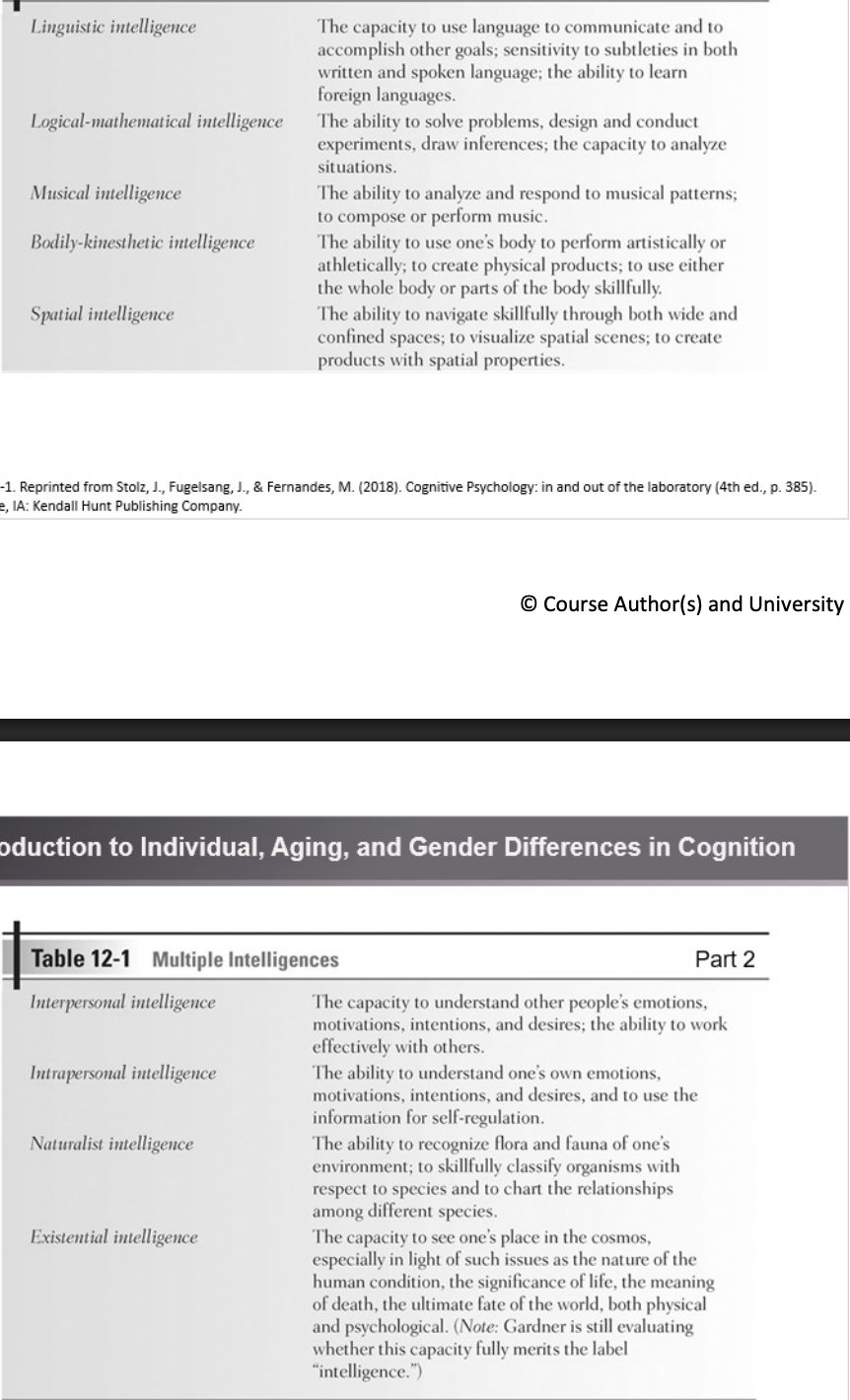Psych 207 - Module 12: Individual, Aging, and Gender Differences in Cognition
1/19
Earn XP
Description and Tags
Name | Mastery | Learn | Test | Matching | Spaced | Call with Kai |
|---|
No analytics yet
Send a link to your students to track their progress
20 Terms
Three major sources of individual differences in cognitive skills
Intelligence, the role of practice and expertise, and bilingualism.
Generally speaking, more intelligent people are
Said to be those that can carry out a basic cognitive process more efficiently. Intelligence is something that is largely inherited from our parents.
9 different dimensions of intelligence
linguistic intelligence, logical-mathematical intelligence, musical intelligence, bodily-kinesthetic intelligence, spatial intelligence, interpersonal intelligence, intrapersonal intelligence, naturalist intelligence, and existential intelligence.

Bilingual - intelligence
Bilinguals are more successful than monolinguals at seeing multiple possibilities from a common stimulus. From an early age, on, bilinguals are better at directing their behaviour to relevant stimuli, and this advantage continues on until older age (although it is diminished somewhat in the prime of adulthood)
Linguistic Intelligence
Definition: The capacity to use language to communicate and accomplish goals; sensitivity to language subtleties.
Example: Writing essays, learning foreign languages, or storytelling.
Logical-Mathematical Intelligence
Definition: The ability to reason, solve problems, perform experiments, and analyze situations.
Example: Solving math problems or conducting a science experiment.
Musical Intelligence
Definition: The ability to understand, create, and respond to musical patterns and compositions.
Example: Playing an instrument or recognizing melodies and rhythms.
Bodily-Kinesthetic Intelligence
Definition: Using one’s body skillfully for artistic or athletic purposes.
Example: Dancing, playing sports, or crafting with hands.
Interpersonal Intelligence
Definition: The ability to understand and interact effectively with others, recognizing their emotions and motivations.
Example: Being a team leader, counselor, or empathetic friend.
Intrapersonal Intelligence
Definition: Understanding one’s own emotions and inner life to guide behavior and self-regulation.
Example: Journaling to reflect on personal growth or making self-aware decisions.
Naturalist Intelligence
Definition: The ability to recognize and classify plants, animals, and features of the natural world.
Example: Identifying bird species or organizing a nature walk.
Existential Intelligence
Definition: The capacity to think deeply about human existence, meaning, and life’s big questions.
Example: Reflecting on the purpose of life or exploring philosophy.
This decline in remembering which experience was associated with which event is a decline in what we referred to as
Episodic memory relies heavily on the frontal lobes, and research has shown that later in life we don’t encode information or retrieve it as well as we did when we were younger. Finally, there has been a specific model, called HAROLD, that associates changes with aging with changes in the frontal lobe of the brain. This model says that the types of executive processes that become impaired as we get older are housed in the frontal lobes. As the frontal lobes deteriorate, so do the processes they are responsible for.
men typically outperform women
on some visual-spatial tasks, such as mental rotation & spatial relation tasks
women outperform men
visual tasks requiring observers to determine when the location of an object has changed.
Language - Men vs. Women
Generally speaking, language skills develop in females earlier than they do in males, and women typically stay more verbally fluent than males throughout their lifespans.
Female and Male - Brain
Generally speaking, it is known that female brains tend to be less lateralized then are male brains. This means that whereas men’s brains are highly specialized in terms of undertaking certain processes in specific areas, this is less the case with women. Because certain tasks tend to be more spread out in women, they often show better recovery than men following brain injury. This is specifically the case with language. Because women’s language is less lateralized than men’s recovery of language after stroke is often better for women than for men.
The Bell Curve – Key Argument
Claims a general cognitive ability ("g") exists and is stable over life.
IQ tests are valid measures of "g".
Properly administered IQ tests are not biased against different groups.
Differences in IQ scores reflect actual ability, not test design.
Effects of Aging - Preserved Functions
- Semantic memory --> increases with advancing age
- Implicit memory --> relatively stable across adulthood
Ability to explicitly recall memory (episodic particularly) declines --> relies on frontal lobes
○ Encoding deficit
○ Retrieval deficit
○ Source memory deficit
- We can help postpone and limit these aging effects by being healthy, and using different memory strategies can be helpful
Effects of Aging - Models
General slowing in processing speed
If we are slower, other info might decay in extra time we need to process first piece of info
Less effective inhibition processes
Trouble ignoring non-relevant info
Reduced availability of attentional resources
If these resources are lacking, hard to block out irrelevant stuff and process what we want
HAROLD model --> hemispheric asymmetry reductions in older adults
Frontal lobes deteriorate and the types of executive processes that decay as we get older deteriorate along with it
However --> use it or lose it --> exercise and use mind to help with these aging effects
Gives an account of bilateral recruitment of brain regions in older adults